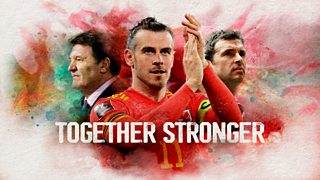Is it ever OK to call someone a 'chav'?
Hayley Pearce explores why the 'chav' stereotype is making a comeback on social media
December 2020

'Chav' is a word that we heard all the time, like ten years ago! But it’s starting to pop up again, with quite a few creators on TikTok and other platforms making videos that take the mick out of people they call ‘chavs’. So it's got me thinking about whether working class people - yes, like myself - get unfairly stereotyped.
I had a chat with Dafydd Francis from the Rhondda and Luke Davies who grew up in Llanelli about why the 'chav' stereotype is back...
For more chat from Hayley Pearce and squad subscribe to The Hayley Pearce Podcast.
What is a ‘chav’?
Hayley: When I think of the word ‘chav’, I think ‘yeah but no but’ Vicky Pollard.
Daf: If I'm running to the shops, I'll chuck on anything and my mates will always call me 'chavvy'. 'Daf the chav' - that was always my nickname when I was younger. I love it, it's banter and I think it's funny. As long as you take into consideration the intent and how they're saying it... it’s a joke.
Luke: 'Chav' is one of the only cliques linked to social class. You have the 'sporty' types, the 'jocks', the 'emos', the 'goths', but 'chav' has such a link to where you are from in terms of background.
Is it just banter?
Hayley: You're right, they're basically saying you're quite cheap and skanky and haven't got money. I've been called a 'chav' in the past. I think it's how people say it, what context they use it in. If they mean 'she's nothing but a chav' and they think they’re better than me, that’s offensive. A bit of banter is fine. If they think they are better than you by mocking the working class, some people may get offended. If middle class people speak down to you and call you a ‘chav’, then of course, it does make a difference.
If you look back at me in The Call Centre days, you can see how people might call me a 'chav'. Looking back, I was. I was mouthy, in your face and I didn't care. I was young. I've grown up now and progressed as a person. If someone called me a ‘chav’ now, I'd be like, 'hang on, I’m not a 'chav' anymore!'.
I remember years ago, this stuck with me: my friend (who's exactly the same as me) turned around and was like, 'You're a chav Hayley'. I was like, 'why?'. She said, 'because you always match all your jewellery and your accessories' and I was like 'what?!'. She was like, 'that's chavvy'. I said, 'I like to be colour coordinated!'. I always thought of a 'chav' like that old tracksuit and big earrings…
Luke: Those earrings always scare me, I think they’re gonna get caught in something. I look at them and think, that’s a walking health hazard!
Hayley: It's not all about how you look. Class is not all about how much money you have in the bank. It’s about how you walk, how you talk and what kind of hobbies you do. It's not all about class, but 'chav' is mainly a stereotype for the working class more than anyone.
Do working class people get stereotyped more than anyone else?
Daf: I don't think working class people get stereotyped more than anyone else. I think even high class people are stereotyped as toffee-nosed and I just think we love to judge and label. I think that's why people look at people from the valleys and say 'they're a bunch of chavs' - just because we are surrounded by scenery and we’re not in the cities. It's narrow minded but I think it's hilarious, I don't find it offensive at all.
Hayley: I like being around people who are quite strong accented. People say 'aww, you're a bit common', but I like being around them people, I feel more relaxed and I vibe off them.
Can the label have a negative impact?
Luke: We all grew up watching Little Britain and Catherine Tate, where people from working class backgrounds are depicted as a certain thing, as a particular stereotype. You have these shows also showing people who are posh and from different backgrounds, but I think where the danger is, is that you're making fun of something, that can possibly disadvantage someone and that can hold someone back. If there's someone from an upper class background in a programme, that's quite unlikely to disadvantage them in regards to their life. But because you've got these shows depicting people from a working class backgrounds in a bad light, it could have an influence, a domino effect.

Hayley: The type of shows I love are those like Stella. I don't think that show portrays the working class in a bad way - they show it as it is and I love that… I do hate the term 'working class'. Why do you have to be labelled with something?
Well, I'm probably OK with being called a 'chav' if it's banter from my mates, but maybe those stereotypes can be harmful sometimes too. There's not just one type of working class and you know what, the people I've grown up with are proper legends. Yeah, they might wear big earrings, but you couldn't ask for better mates or better people.
This article was originally published on 24 August 2020.
Related Links
Latest features from ����ý Wales
The 'chav check' trend on TikTok
����ý Journalist, Sophia Smith-Galer on why the stereotyping of 'chavs' has gone viral...
You could be an influencer followed by millions, or an ordinary user followed by no one - but both of you could go viral with the right content. As soon as one video format goes viral, others try to imitate it - and that is how trends on TikTok begin.
It's then of little surprise that the lazy stereotyping of certain British schoolgirls as 'chavs' has gone viral. If people find it funny - so funny that they want to share it with a friend or make their own version of it - it can easily rack up the views.
There is a lot of content on TikTok that is received both positively and negatively - dark humour is rampant on the platform and some things considered poor taste to some can still perform well. In the circumstances where it goes so far it violates community guidelines, it can be reported - but even in those cases, moderation isn't always successful, as I reported here.
But in an online world full of glow ups and make-up tutorials with high-end production value, the 'chav' trend is also an antidote to the ring-lit, overly perfect world of beauty influencers.

















